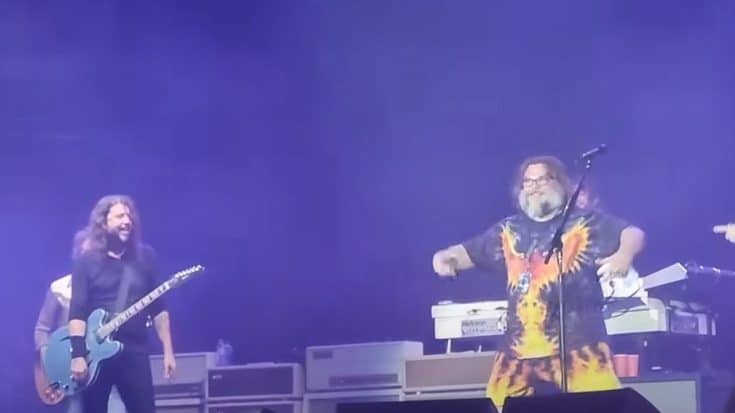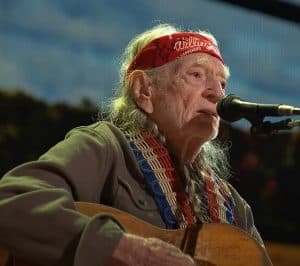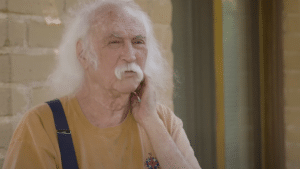Watch Jack Black Team up With Foo Fighters To Cover AC/DC’s “Big Balls”

via kiwistu / Youtube
In a rock & roll moment that electrified Auckland, New Zealand, comedic powerhouse Jack Black stormed the Foo Fighters’ opening night stage, lending his unmistakable growl to a raucous rendition of AC/DC’s legendary anthem, “Big Balls”.
Joining forces with Fiona Jeans, the band’s ever-dynamic drum tech who tackled the tongue-in-cheek verses, Black injected the performance with both humor and heart.
Ditching his Tenacious D garb for a tie-dye explosion, Black became a whirlwind of animated energy, leaping across the stage, arms outstretched, and channeling the spirit of Bon Scott with every bellowed lyric.
The energy in the stadium was palpable, a potent cocktail of rock & roll history, comedic exuberance, and pure love for the music. From Black’s manic stage presence to the crowd’s thunderous singalongs, watch the moment that transcended mere fandom, becoming a testament to the unifying power of a great song and the electrifying chemistry when talented musicians collide.
The ultimate modern-day rock and roll bromance
The electrifying collaboration between Jack Black and the Foo Fighters on stage in Auckland wasn’t just a one-off jam session. It was the latest chapter in a long-standing bromance between two of rock’s most dynamic personalities.
Black, currently Down Under filming the Minecraft movie, has joined Dave Grohl’s hard rock outfit on several occasions in recent years, their shared love for classic rock fueling fiery covers of anthems by AC/DC, Rush, Led Zeppelin, and others.
This musical camaraderie runs deep. Back in 2001, Grohl lent his thunderous drumming skills to Tenacious D’s self-titled debut album. Grohl’s musical chemistry with Black translated to the big screen as well, with the Foos’ frontman making a memorable cameo in the 2006 film Tenacious D in The Pick of Destiny.
This rock & roll bromance even pushed the boundaries of mainstream media. In 2002, Black and Grohl teamed up for the music video of “Low”, the third single from Foo Fighters’ album One on One. The video, featuring outrageous costumes and plenty of comedic antics, was promptly banned by MTV for its suggestive content.
A controversial collaboration that got the MTV ban hammer
Chris Shiflett, the guitarist for Foo Fighters, shared his thoughts on the music video in an interview with NME. Grohl and Black play characters in the video who have a highly nontraditional and dubious personality.
Shiflett humorously called their antic “white-trash porn” and praised Dave for showing a part of himself that the public had never seen before, highlighting how daringly he portrayed himself.
Speaking about the controversial song, the frontman stated that he hoped it would become a hit and described it as the kind of music that people hope will become widely successful.
Grohl added that it was quite popular, but he thought that because it was so unusual and strange, it might not become a hit song. The band thought the accompanying music video was “totally funny, but totally fake”, but MTV objected to its contentious nature and opted to prevent it from running.
A tongue-in-cheek satire about the high society
Originally released as the sixth song on the Dirty Deeds Done Dirt Cheap album in September 1976, “Big Balls” is a noteworthy track in the repertoire of Australian hard rock giants AC/DC. The song demonstrates the band’s distinctive style and irreverent attitude and is credited to the creative brains of Angus Young, Malcolm Young, and Bon Scott.
Internationally, the song was the third track on the global release of Dirty Deeds Done Dirt Cheap, hitting the music scene in November 1976. However, it’s interesting to note that the international version of the album did not see the light of day in the United States until April 1981, adding an element of delayed exposure for American audiences.
“Big Balls” cranks up the heat on high society with a playful wink and a mischievous grin. It’s a satirical dance through fancy galas and waltzing expectations, poking fun at the gilded trappings and unspoken rules of the upper crust.
Scott’s lyrics brim with double entendres, slyly highlighting the absurdities of privilege and the pressure to fit in, even when the demands are downright ridiculous. It’s a tongue-in-cheek celebration of individuality, a reminder that beneath the polished veneer, everyone’s just toe-tapping to their own beat.













